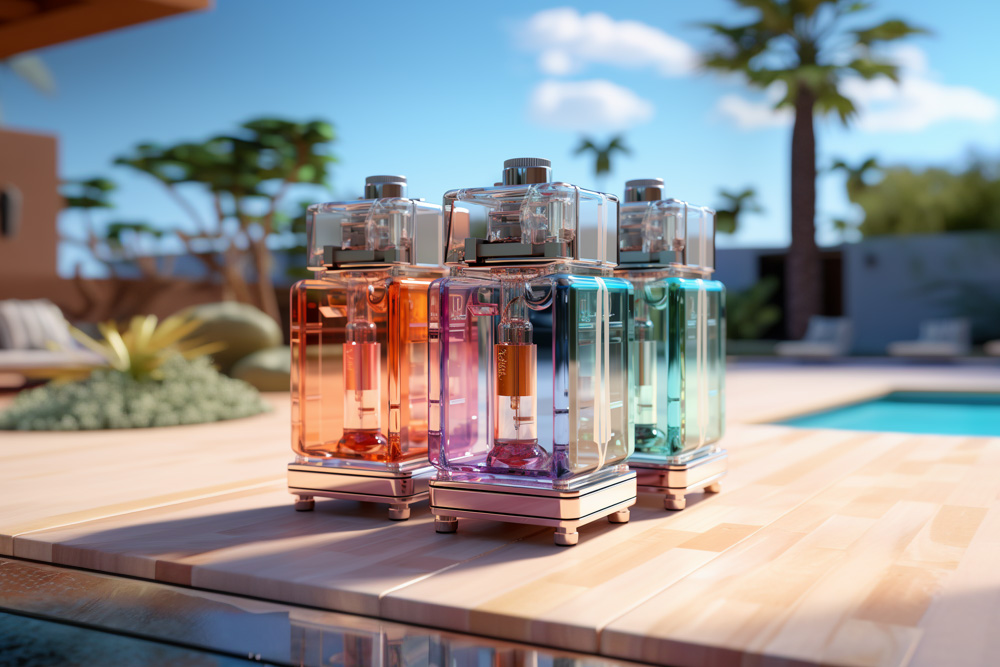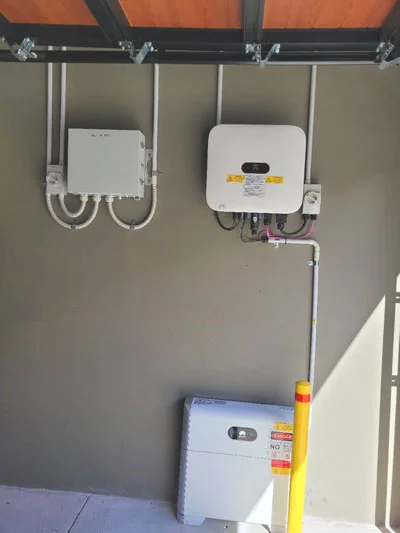
Image: Solar batteries in 2045 as imagined by Midjourney AI
A solar battery storage system stores energy generated by the sun and your solar panels. Battery storage allows you to use solar energy even when the sun is not shining, such as at night or on cloudy days. It also gives you the option of keeping and using your precious energy instead of selling it back to the energy company – heavily discounted.
Solar battery storage explained
Solar batteries work by converting Direct Current (DC) electricity generated by solar panels into alternating current (AC) electricity, which is the type of electricity used in homes. The AC electricity is then stored in your battery storage system. When you need electricity, the battery converts the stored AC electricity into DC electricity and sends it to your home’s electrical system.
There are two battery storage options
Lead-acid batteries
Lead-acid batteries are the most common type of battery storage, but they are not as efficient as lithium-ion batteries.
Lithium-ion batteries
Lithium-ion batteries are more expensive, but they have a longer lifespan and can store more energy.
What about a hybrid solar battery system?
 A hybrid solar system is similar to our traditional solar systems but they combine solar panels with battery storage. This allows you to store solar energy for when the sun is not shining. Hybrid solar systems are a good option for homes that want to reduce their reliance on the grid and save money on electricity bills.
A hybrid solar system is similar to our traditional solar systems but they combine solar panels with battery storage. This allows you to store solar energy for when the sun is not shining. Hybrid solar systems are a good option for homes that want to reduce their reliance on the grid and save money on electricity bills.
Here are some of the benefits of a hybrid solar system:
- You can use solar energy even when the sun is not shining.
- You can reduce your reliance on the grid.
- You can save money on your electricity bills.
- You can increase the value of your home.
Hybrid Solar is More Expensive in the short term
In the short term, a hybrid solar system might be the best option because it offers more flexibility than a traditional solar system. Home solar battery storage systems can be very expensive in the short term. With a hybrid system, you can store solar energy and use it when you need it. This can be especially helpful during peak electricity demand hours, when the cost of electricity is typically higher.
However, the upfront cost of a hybrid solar system is typically more than a traditional solar power system. Also, the battery part of a hybrid system will need to be replaced periodically – which needs to be budgeted in.
If you are considering solar batteries for your home, it is important to weigh the pros and cons of each type of system and choose the one that is right for you.
Further Reading
- What is battery storage? (Australian Renewable Energy Agency [ARENA.gov])
- 2GWh of large-scale battery storage (Energy Storage News)
Solar Batteries FAQs
What is the best way to store batteries?
The best way to store solar batteries is in a cool, dry, well-ventilated environment. The ideal temperature range is between 15ºC and 20ºC (or 59ºF and 68ºF). Avoid storing your batteries in direct sunlight, heat sources, or freezing temperatures.
Here are some other things to keep in mind when storing solar batteries:
- Store solar batteries in a clean, dry place.
- Avoid storing the batteries in contact with other materials, such as metal or plastic.
- Do not store the batteries in a humid environment.
- If possible, store the batteries in a battery box or other enclosure.
- Inspect the batteries regularly for signs of damage or corrosion.
Is a 10kW battery system enough?
It really depends on your energy needs and the climate you live in.
A 10kW solar system can generate about 40kWh of electricity per day in ideal conditions. However, the amount of electricity generated will vary depending on the amount of sunlight, the orientation of your solar panels, and the shading on your roof.
A 10kWh battery storage system can store about 9.7kWh of electricity. This means that it can store enough energy to power your home for about 2.4 hours during a cloudy day or at night.
If your daily energy needs are less than 20kWh, then a 10kW solar system with a 10kWh battery storage system may be enough to meet your needs. However, if your daily energy needs are higher than 20kWh, then you will need a larger solar system and/or battery storage system.
You can also consider using a hybrid solar system, which combines solar panels with a battery storage system and a backup generator. This type of system can provide you with electricity even during extended periods of cloudy weather or power outages.



